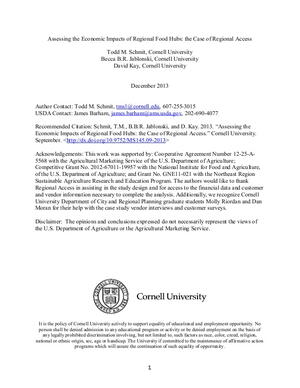
What Is the Issue?
In the past five years, there has been a proliferation in the number and recognition of ‘food hubs’ across the United States, as well as a substantial increase in foundation and public funding to support their development. In addition to generating economic value within a local economy, funders and policy makers are also acutely attentive to the impact of food hubs on local agricultural producers. While there is a substantial and growing literature that examines food hub activities, there have been few comprehensive, data-driven economic impact assessments completed to date. To adequately address this issue and to provide a replicable framework for similar studies, a best-practice methodology is needed to rigorously evaluate the economic contributions of food hubs on their local economies and the participating farms they support.
Furthermore, a better understanding of food hub activities is needed to evaluate the extent to which food hubs increase the overall demand for and consumption of local food products. Additionally, whether there is demand from customers to expand the availability of food hub products and services in light of opportunities to purchase products from traditional food distributors.
What Did the Study Find?
The study developed a replicable empirical framework to conduct impact assessments for food hub organizations. By collecting detailed expenditure and sales information from food hubs, an economic impact assessment was conducted to estimate the multiplier effects of a change in final demand for food hub products. By using data from the farms supplying products to the hub, we provide more accurate assessments than that available using secondary data.
Another helpful resource is USDA's Food Access Research Atlas, which provides food access data for populations within census tracts. The Farmers Market Search is also a handy tool to identify farmers markets in and around your community.
